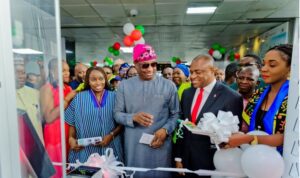Afreximbank tasks Nigeria on investment diversification
The African Export- Import Bank (Afreximbank) on Tuesday urged the Nigerian Investment Promotion Commission (NIPC) to do more in attracting a greater volume and variety of investment into Nigeria.
Mr Amr Kamel, Executive Vice President, Business Development and Corporate Banking, Afreximbank, declared this at the Lagos Chamber of Commerce and Industry (LCCI) 2021 virtual Lagos International Investment Conference.
The conference had the theme: “Repositioning Nigeria as a Key Global Investment Destination”.
Kamel, represented by Mr Intong Monchu, Regional Chief Operating Officer, Abuja Branch, said the advice was pertinent to turning Nigeria into a prime and viable investment destination.
He noted that the country’s Foreign Direct Investments (FDI) inflows which faced a decline of 48.5 per cent in 2019 alternately recorded a stock growth over the past three years to reach $98.6bn in 2019.
Kamel furthered that the number and value of greenfield investments had been on a similar trajectory, steadily growing from 36 projects worth $4.8bn in 2017 to reach 76 projects worth $10.2bn in 2019.
“Dampened global demand for commodities is a major headwind facing Nigeria, a commodity export based economy.
“Depressed oil prices and the COVID-19 crisis in 2020 and 2021 are continuing impediments to inward investment in Nigeria.
“Investment diversification is a long term objective for Nigeria given the decline in oil and gas investment particularly economic diversification for non oil investments,” he said.
Kamel listed Gross Domestic Product (GDP) growth, macro instability, financial development, exchange rates, inflation, interest rates, regulatory environment and the ability to repatriate profits as key determinants to attract FDI.
He added that the country must address its infrastructure deficit such as power, ports, roads, rails, and government should encourage partnerships between foreign and local businesses.
“Foreign and domestic businesses should be treated equally and with regulations that should be open, transparent and have dependable conditions for all kinds of firms, be they foreign or local.
“Foreign firms might be familiar with global good business practices, but local firms will be more familiar with the indigenous context and this synergy could be very beneficial.
“State governments must be more involved as different States in Nigeria have unique opportunities and challenges which could be more favorable to certain investments,” he said.
Kamel reiterated the bank’s commitment to supporting Nigeria’s FDI inflows increase via a number of its initiatives such as a 500-bed medical facility in Abuja, African Quality Assurance Centre (AQAC) in Abeokuta and adequate financial provisions.
Mr Bola Koko, Chief Executive Officer, FMDQ Group said positioning the Nigerian non-oil sector as a destination for investments (domestic and foreign) can be partly realised through a vibrant capital market, characterized by high level of liquidity, depth and transparency.
Dr Vincent Nwani, Economist, FMDQ, who represented Koko, said the country must incentivise foreign capital inflows through viable investments opportunities.
He tasked government to address major drawbacks such as multiplicity of taxes, reforms and regulations, insecurity, contract sanctity and easy access to finance, and idle capital facilities lying around the country.
“Nigeria’s economy remains largely dependent on foreign exchange earnings from the Oil and Gas sector even though it only accounts for 10 per cent of the country’s GDP and employs less than 1 per cent of the labour force.
“The FX market plays a crucial role in unlocking investment opportunities for the development of the non-oil sector and delivering prosperity in the Nigerian economy through the facilitation of international trade and promotion of capital flows to the economy,” he said.
Mr Temitayo Abiodun, an Industrial Digital Transformation Consultant, said opportunities and funding to go green in spite of Nigeria being an oil producing country were viable investments options.
Abiodun said the opportunities existed particularly in projects such as carbon capture, nuclear energy among others to reduce burning of fossil fuels.
“There is a lot of technology transfer, investment and job creation in that area through the adoption of technologies that would help the circular economy and this should be looked into to drive FDI for the country,” he said.




